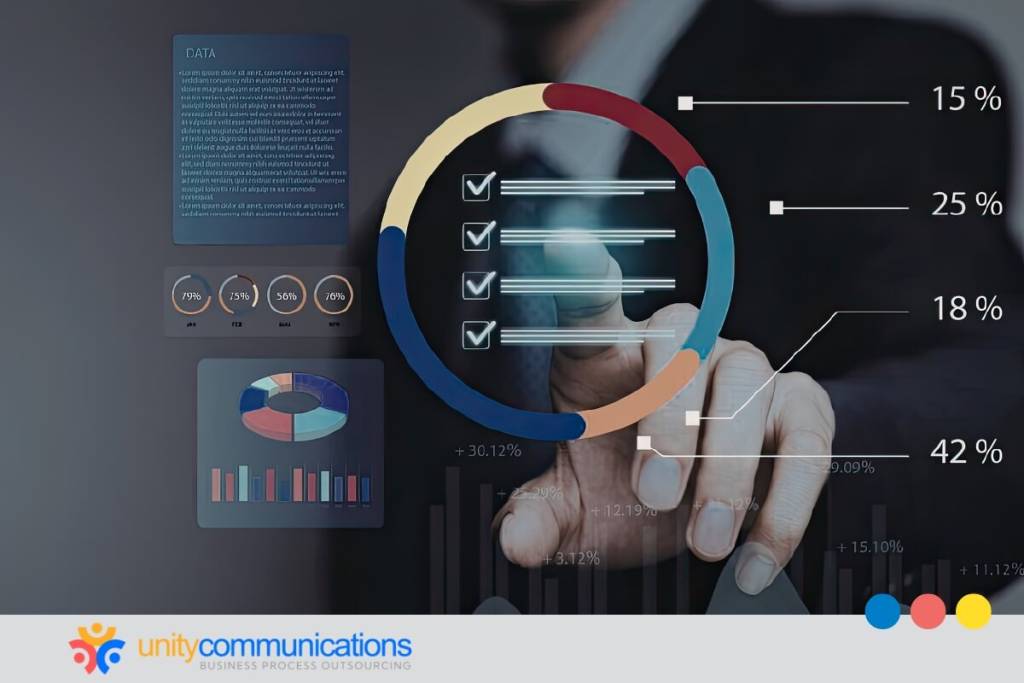IN THIS ARTICLE
Table of Contents
The adoption of artificial intelligence (AI) technology triggers a monumental shift across industries. In business process outsourcing (BPO), AI reshapes and enhances customer service, data management, and other processes through machine learning (ML), robotic process automation (RPA), and natural language processing (NLP).
As more firms adopt AI-powered BPO, business leaders and managers must keep pace to remain competitive. But they must first understand its benefits and challenges to maximize the technology. This article explores AI’s role in outsourcing, its benefits for operations, and its impact on the future of service outsourcing. Keep reading for actionable insights!
Overview of AI’s role in outsourcing

AI systems are designed to simulate human intelligence processes, including learning, problem-solving, and decision-making. They are pivotal in automating tasks, improving operational efficiency, and enhancing service quality across industries. Hence, the global AI market is expected to reach $1.3 trillion by 2030.
How is AI improving what BPO is doing? AI is revolutionizing BPO by further streamlining traditionally outsourced tasks, such as data entry, customer service, and technology support. Automation in the BPO industry completes these tasks faster and more accurately, reducing errors and operating costs.
Generative AI and NLP have significantly improved customer interactions. AI-powered chatbots now handle inquiries 24/7, delivering instant responses and solutions. This shift has reduced reliance on human agents, redefining traditional outsourcing models.
As outsourcing firms strive to remain competitive, AI has become essential for optimizing operations, driving innovation, and minimizing manual labor. From improving backend processes to transforming customer service delivery, AI is reshaping the global BPO landscape.
Key benefits of integrating AI into outsourcing operations
Businesses looking to improve their bottom line and streamline operations can greatly benefit from integrating AI into outsourcing. The capacity to automate repeated processes is one of the most apparent benefits since it may significantly cut down on the time and expense of manual work.
Through RPA, businesses can automate routine tasks, including invoice processing, data entry, and order fulfillment. This speeds up workflows and minimizes the risk of human error. Another vital role of AI in outsourcing is enhancing data analytics capabilities, allowing businesses to extract more meaningful insights from large datasets.
Businesses and outsourcing partners can make better judgments by employing ML algorithms to identify trends and patterns in data. AI technologies may also forecast consumer behavior, streamline supply chains, and offer more individualized customer experiences, increasing customer satisfaction and loyalty.
Scalability is yet another essential advantage of AI-powered outsourcing. Because AI systems can manage high job quantities without sacrificing quality, organizations can expand their operations more easily without incurring substantial overhead expenditures.
AI’s role in automating repetitive and time-consuming tasks
Repetitive, time-consuming tasks have long been a hallmark of outsourcing operations, often requiring significant human intervention. AI has revolutionized this aspect by introducing intelligent automation that reduces the need for manual effort in mundane tasks.
Through AI and machine learning models, businesses can train systems to perform highly repetitive actions, such as data input, transaction processing, and other routine functions. For example, AI’s role in outsourcing allows quick invoice processing, email sorting, and automated bot management of large volumes of customer inquiries.
RPA is one of the key technologies enabling this AI-enabled shift. It uses AI to simulate human actions and interactions with various software applications, automating tasks such as report generation, data entry, and customer feedback processing.
This degree of automation boosts output and employee satisfaction by lowering workloads and freeing human resources to concentrate on more critical tasks. These value-added activities include strategy development, problem-solving, and customer relationship management.
Enhancing data analytics and decision-making through AI

AI’s contribution to improving analytics has become essential in this big data era. These days, outsourcing managers may use AI tools to sort through enormous volumes of data in real time and derive valuable insights that improve decision-making. Businesses can use AI systems to identify trends and make data-driven suggestions using predictive analytics.
AI-powered customer support systems, for instance, use data analytics to monitor consumer preferences and behavior. This data allows for personalized services, increased client satisfaction, and higher retention rates.
Additionally, outsourcing firms can find process inefficiencies, streamline workflows, and enhance overall operational performance using AI’s capacity to analyze and interpret complicated datasets.
As companies continue to expand their use of AI, data analytics will become a more integral part of decision-making processes. Better data enables outsourcing managers to make decisions more quickly and intelligently, improving the overall caliber of services offered to customers.
Cost reduction and improved efficiency with AI in outsourcing
AI costs depend on goals, system complexity, and customization. Basic AI solutions, such as chatbots and recommendation engines, start around $10,000, but more complex projects cost over $200,000.
Pre-built tools offer a cost-effective alternative for businesses not ready to invest in custom AI. Cloud-based services from providers such as AWS, Google Cloud, and Microsoft Azure use pay-as-you-go pricing, with monthly costs up to $40,000 based on usage. These flexible options enable companies to enhance services without significant upfront costs.
With BPO, businesses can access AI tools at an even lower cost. This also compounds the cost-cutting benefit traditional outsourcing offers. AI solutions reduce the need for large outsourcing teams, cutting overhead and reallocating resources efficiently. This is why 94% of businesses rely on service providers to develop AI and ML technologies.
AI streamlines tasks such as customer service, marketing, and supply chain management, cutting labor, training, and management costs. AI systems operate 24/7, boosting productivity and eliminating the need for overtime or extra staff during peak periods.
In addition to cost savings, AI enhances efficiency. AI systems complete tasks faster and more accurately than humans, such as analyzing complex data sets and generating insights in minutes. This accelerates decision-making, improves operations, and elevates customer service.
Challenges businesses face when adopting AI in outsourcing
While AI’s role in outsourcing is multifaceted and advantageous, businesses must overcome several challenges in its adoption. One primary concern is data security.
The global average data breach cost in 2024 is $4.88 million, with breaches involving public cloud storage reaching up to $5.17 million. To mitigate this, companies should use end-to-end data transfer and storage encryption, conduct regular BPO security audits, and consider federated learning, enabling decentralized AI model training to reduce breach risks.
Additionally, companies unfamiliar with AI systems may struggle to integrate them into existing workflows. Proper planning, expertise, and ongoing training are necessary to ensure smooth transitions to AI-powered processes.
Another issue is ethical considerations, especially regarding openness and data privacy. To preserve trust and prevent privacy concerns, businesses must explain how AI systems gather and use consumer data. AI-driven outsourcing must adhere to ethical standards to comply with data protection laws.
AI’s rapid evolution adds another layer of complexity. Companies must stay updated with advances through continuous learning programs and partnerships with research institutions. Lastly, with AI potentially automating 300 million jobs worldwide, companies must retrain their workforce with AI-related skills to navigate these changes and ensure a smooth transition.
AI’s impact on workforce roles and job transformation in outsourcing

The rise of AI in call centers and the BPO industry is reshaping workforce roles. While AI automates many routine tasks, it also enables employees to focus on more strategic and value-driven activities. This shift allows workers to engage in complex problem-solving, creative projects, and relationship-building, enhancing overall business value.
However, AI’s impact on role transformation in outsourcing could lead to job displacement in certain areas, as AI reduces the need for human involvement in repetitive tasks. To manage this transition, outsourcing managers must reskill employees and prepare them for new roles within the organization.
Businesses should invest in training programs that equip workers with AI-related skills, ensuring they are ready for the evolving demands of the outsourcing sector. By promoting a culture of lifelong learning and adaptation, companies can support employees in adjusting to the changing workforce landscape.
Maintaining data security and ethical practices in AI-driven outsourcing
Businesses must consider ethical concerns and data protection as AI becomes increasingly common in outsourcing. AI systems require massive amounts of data to work, raising privacy concerns and possibly misusing sensitive data.
Companies must implement strong security measures and abide by applicable data protection rules, such as the General Data Protection Regulation (GDPR).
Additionally, the ethical use of AI must be considered, particularly regarding issues such as bias in AI algorithms. AI systems should be designed to make fair and unbiased decisions, ensuring they don’t perpetuate existing inequalities or discrimination.
Businesses must act proactively to guarantee that their AI systems are open, responsible, and aligned with moral standards.
The bottom line
AI has undoubtedly become a game changer in the outsourcing industry, automating routine tasks and enhancing decision-making through data analytics. AI’s role in outsourcing grows as technology evolves, providing businesses new opportunities to streamline operations, reduce costs, and improve service delivery.
To fully leverage AI’s potential, outsourcing managers must integrate AI tools, address implementation challenges, and remain committed to ethical practices. By doing this, businesses can guarantee long-term success and unleash new levels of efficiency.
Let’s connect to explore how AI-powered BPO solutions can elevate your outsourcing strategy and drive innovation within your organization.





